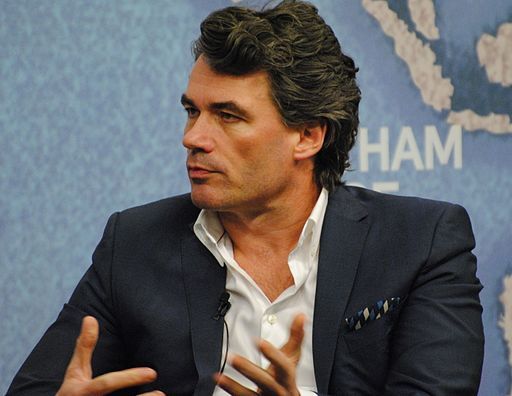At what point does it become okay to say that British Telecom and Yahoo are knowingly profiting from fraud?
If you are against fraud but then find out that you're unwittingly profiting from it... and you could take steps to sever your connection to that fraud immediately... but you choose not to do so... and days - even weeks later - you're still profiting from that fraud... well then, at some point, isn't it fair to reach the conclusion that you're just, y’know, knowingly profiting from fraud?
And if that's the case, in what way are you, y'know, against fraud?
 Marissa Mayer, CEO of Yahoo, who profit from fraud
Marissa Mayer, CEO of Yahoo, who profit from fraud
Photo used under CC licence.
Attrib: By Yahoo from Sunnyvale, California, USA Gavin Patterson, CEO of BT, who profit from fraud.
Gavin Patterson, CEO of BT, who profit from fraud.
Photo used under CC licence, attribution: By Chatham House
At this point, I guess I ought to say that this blog post probably won't make a lot of sense unless you've read my post from a couple of days ago. It's long so I recommend making a cup of tea before you start, but it details how I frequently see BT and Yahoo carrying ads for fraud on their networks and how those ads continue to appear on their networks, often for days after they're reported.
By the way, when I say "fraud" I don't mean "things I don't like" or "products that I think don't work, grrr" I mean actual, criminal, steal-your-money, fraud.
Sometimes, weeks after they've acknowledged an ad is fraudulent, identical ads leading to the very same websites will still be appearing on their networks.
This seems to me to be negligent on their behalf. And as I've been corresponding with the two companies about it since July last year - and with particular frequency throughout February - I don't really see how either entity could claim to be ignorant of their role in enabling these scams to prosper.
This morning, I emailed Michael Todd (Executive Level Technical Complaints, BT), Gavin Patterson (CEO, BT) and Charles Stewart (PR Manager, Public Policy, Yahoo) the following few questions:
Question 1: Every time you run one of these ads, you expose your customers to the risk of fraud. Are ads subject to any kind of editorial review before they are accepted on to your network?
Question 2: If ads are subject to editorial review - how did these ads pass? Even allowing for human error, initially - how is it that ads you have been made aware of, continue to get through?
Question 3: It is now abundantly clear that, even after a month of pushing, Yahoo is a) unable to remove ads quickly and b) unable or unwilling to adequately block ads. In which case, do you agree that continuing to run ads through this system means you are now aware that fraudulent ads can and will get through and won't be removed promptly, exposing your customers to harm?
Question 4: BT's CEO has made it very clear that BT people should turn down business when it would force the company to compromise their principles. Does this compromise your principles? Or is there an acceptable amount of fraud that you are happy to expose your customers to?
They seem kind of shy of answering straight questions and have previously expressed a desire for me to not publicise the contents of our interactions thus far... but I don't think these are complicated questions - and I don't think there's anything here for companies of this scale to shy away from.
If they come back to me, I'll let you know what they say.
And if that's the case, in what way are you, y'know, against fraud?
 Marissa Mayer, CEO of Yahoo, who profit from fraud
Marissa Mayer, CEO of Yahoo, who profit from fraudPhoto used under CC licence.
Attrib: By Yahoo from Sunnyvale, California, USA
 Gavin Patterson, CEO of BT, who profit from fraud.
Gavin Patterson, CEO of BT, who profit from fraud.Photo used under CC licence, attribution: By Chatham House
At this point, I guess I ought to say that this blog post probably won't make a lot of sense unless you've read my post from a couple of days ago. It's long so I recommend making a cup of tea before you start, but it details how I frequently see BT and Yahoo carrying ads for fraud on their networks and how those ads continue to appear on their networks, often for days after they're reported.
By the way, when I say "fraud" I don't mean "things I don't like" or "products that I think don't work, grrr" I mean actual, criminal, steal-your-money, fraud.
Sometimes, weeks after they've acknowledged an ad is fraudulent, identical ads leading to the very same websites will still be appearing on their networks.
This seems to me to be negligent on their behalf. And as I've been corresponding with the two companies about it since July last year - and with particular frequency throughout February - I don't really see how either entity could claim to be ignorant of their role in enabling these scams to prosper.
This morning, I emailed Michael Todd (Executive Level Technical Complaints, BT), Gavin Patterson (CEO, BT) and Charles Stewart (PR Manager, Public Policy, Yahoo) the following few questions:
Question 1: Every time you run one of these ads, you expose your customers to the risk of fraud. Are ads subject to any kind of editorial review before they are accepted on to your network?
Question 2: If ads are subject to editorial review - how did these ads pass? Even allowing for human error, initially - how is it that ads you have been made aware of, continue to get through?
Question 3: It is now abundantly clear that, even after a month of pushing, Yahoo is a) unable to remove ads quickly and b) unable or unwilling to adequately block ads. In which case, do you agree that continuing to run ads through this system means you are now aware that fraudulent ads can and will get through and won't be removed promptly, exposing your customers to harm?
Question 4: BT's CEO has made it very clear that BT people should turn down business when it would force the company to compromise their principles. Does this compromise your principles? Or is there an acceptable amount of fraud that you are happy to expose your customers to?
They seem kind of shy of answering straight questions and have previously expressed a desire for me to not publicise the contents of our interactions thus far... but I don't think these are complicated questions - and I don't think there's anything here for companies of this scale to shy away from.
If they come back to me, I'll let you know what they say.

Published on March 02, 2017 06:53
No comments have been added yet.
Dave Gorman's Blog
- Dave Gorman's profile
- 204 followers
Dave Gorman isn't a Goodreads Author
(yet),
but they
do have a blog,
so here are some recent posts imported from
their feed.



